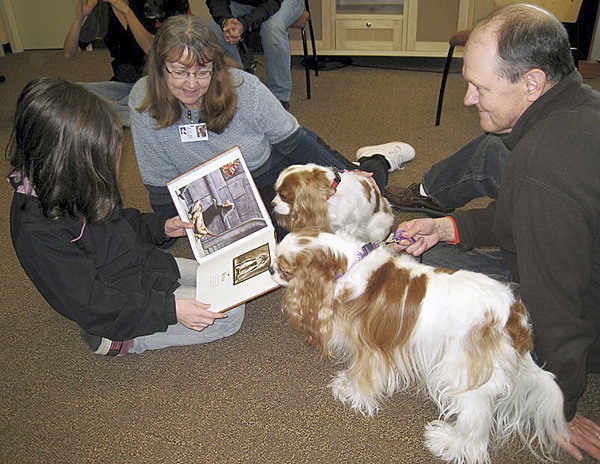Do you remember what it felt like to learn to read? To most adults, years of everyday, fluent reading can obscure those early struggles with words. The San Juan Island Library, however, has not forgotten.
The library’s Island Tail Tutor program accommodates young and shy readers, encouraging confidence by allowing children to read to dogs.
“Reading aloud can be a terribly frightening experience for kids,” said Melina Lagios, youth services librarian and interim director. “The dogs have a way of putting the children at ease. They don’t laugh or snigger, they have a built-in patience.”
The program has now had two terms: a winter January-March session and a summer July session. It was formed as a partnership between the library and the Friday Harbor Animal Shelter.
Lagios started working at the library in October 2009 and, “shortly thereafter I started asking people if there were certified therapy dogs on the island.” Interestingly, Lagios was not the only person considering the idea of a dog and child reading program.
Tawny Martel of the Animal Protection Society of Friday Harbor was also beginning to explore the idea. So when the two got in touch and started talking, it was less a case of “if” the project would go ahead, but “when.”
“Great minds were thinking alike,” Martel said.
“We met at the library and started brain storming,” said Lagios, describing the planning behind Island Tail Tutors. The two hit upon the name and the idea of launching the reading program at the same time as the shelter’s Kennel Kids program. The latter program is a community outreach program to get children excited about animal handling. As both Lagios and Martel say, the two concepts seemed to complement each other, as an extra objective of Island Tail Tutors is to familiarize children with correct behavior around dogs. “It was perfect how it lined up,” Lagios said.
From there, it was a case of recruiting volunteers and therapy-certified dogs.
“These are not just pets or dogs off the street, these are dogs trained to work with people” Lagios said. Martel volunteered her dog Lucky; Jim and Carol Hooper volunteered their two dogs. In the winter session, the program had an additional three animals. Children in grades K-4 signed up for 15-minute sessions with the dogs, and Lagios said the benefits were visible.
“What I’ve definitely noticed is there is an increase in interest. It becomes a social thing. The kids talk about books, they have an increased excitement about reading.”
Martel agreed, saying that she saw improvements in reading skills, in confidence levels around dogs and in reading out loud.
Lagios said that more children participated in the winter session, with about 10 attending for each session to claim a reading slot. Although the summer was a little quieter, the program will run again next winter, and Lagios thinks it will be just as successful.
“We’re planning on doing a session in January, February and March.”




